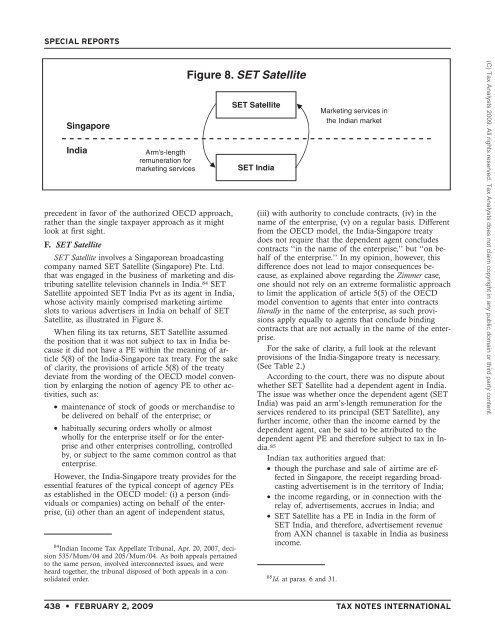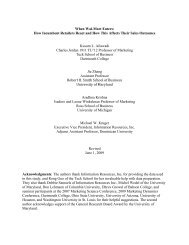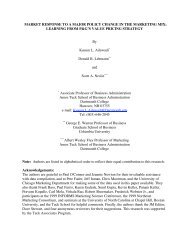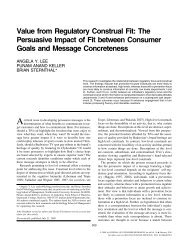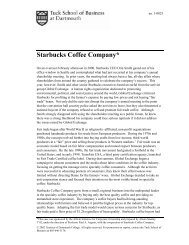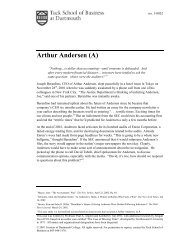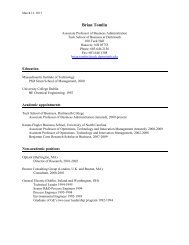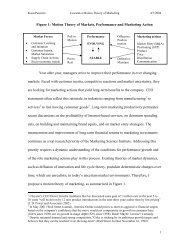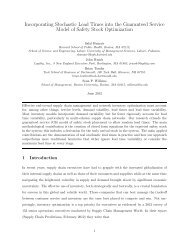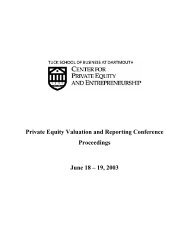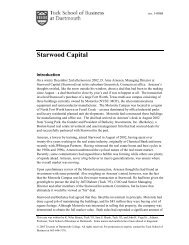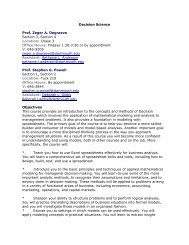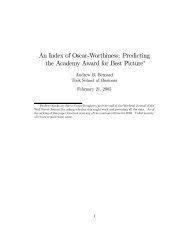tax notes international - Tuck School of Business - Dartmouth College
tax notes international - Tuck School of Business - Dartmouth College
tax notes international - Tuck School of Business - Dartmouth College
Create successful ePaper yourself
Turn your PDF publications into a flip-book with our unique Google optimized e-Paper software.
SPECIAL REPORTS<br />
Singapore<br />
India<br />
precedent in favor <strong>of</strong> the authorized OECD approach,<br />
rather than the single <strong>tax</strong>payer approach as it might<br />
look at first sight.<br />
F. SET Satellite<br />
SET Satellite involves a Singaporean broadcasting<br />
company named SET Satellite (Singapore) Pte. Ltd.<br />
that was engaged in the business <strong>of</strong> marketing and distributing<br />
satellite television channels in India. 84 SET<br />
Satellite appointed SET India Pvt as its agent in India,<br />
whose activity mainly comprised marketing airtime<br />
slots to various advertisers in India on behalf <strong>of</strong> SET<br />
Satellite, as illustrated in Figure 8.<br />
When filing its <strong>tax</strong> returns, SET Satellite assumed<br />
the position that it was not subject to <strong>tax</strong> in India because<br />
it did not have a PE within the meaning <strong>of</strong> article<br />
5(8) <strong>of</strong> the India-Singapore <strong>tax</strong> treaty. For the sake<br />
<strong>of</strong> clarity, the provisions <strong>of</strong> article 5(8) <strong>of</strong> the treaty<br />
deviate from the wording <strong>of</strong> the OECD model convention<br />
by enlarging the notion <strong>of</strong> agency PE to other activities,<br />
such as:<br />
• maintenance <strong>of</strong> stock <strong>of</strong> goods or merchandise to<br />
be delivered on behalf <strong>of</strong> the enterprise; or<br />
• habitually securing orders wholly or almost<br />
wholly for the enterprise itself or for the enterprise<br />
and other enterprises controlling, controlled<br />
by, or subject to the same common control as that<br />
enterprise.<br />
However, the India-Singapore treaty provides for the<br />
essential features <strong>of</strong> the typical concept <strong>of</strong> agency PEs<br />
as established in the OECD model: (i) a person (individuals<br />
or companies) acting on behalf <strong>of</strong> the enterprise,<br />
(ii) other than an agent <strong>of</strong> independent status,<br />
84 Indian Income Tax Appellate Tribunal, Apr. 20, 2007, decision<br />
535/Mum/04 and 205/Mum/04. As both appeals pertained<br />
to the same person, involved interconnected issues, and were<br />
heard together, the tribunal disposed <strong>of</strong> both appeals in a consolidated<br />
order.<br />
Figure 8. SET Satellite<br />
SET Satellite<br />
Arm’s-length<br />
remuneration for<br />
marketing services SET India<br />
(iii) with authority to conclude contracts, (iv) in the<br />
name <strong>of</strong> the enterprise, (v) on a regular basis. Different<br />
from the OECD model, the India-Singapore treaty<br />
does not require that the dependent agent concludes<br />
contracts ‘‘in the name <strong>of</strong> the enterprise,’’ but ‘‘on behalf<br />
<strong>of</strong> the enterprise.’’ In my opinion, however, this<br />
difference does not lead to major consequences because,<br />
as explained above regarding the Zimmer case,<br />
one should not rely on an extreme formalistic approach<br />
to limit the application <strong>of</strong> article 5(5) <strong>of</strong> the OECD<br />
model convention to agents that enter into contracts<br />
literally in the name <strong>of</strong> the enterprise, as such provisions<br />
apply equally to agents that conclude binding<br />
contracts that are not actually in the name <strong>of</strong> the enterprise.<br />
For the sake <strong>of</strong> clarity, a full look at the relevant<br />
provisions <strong>of</strong> the India-Singapore treaty is necessary.<br />
(See Table 2.)<br />
According to the court, there was no dispute about<br />
whether SET Satellite had a dependent agent in India.<br />
The issue was whether once the dependent agent (SET<br />
India) was paid an arm’s-length remuneration for the<br />
services rendered to its principal (SET Satellite), any<br />
further income, other than the income earned by the<br />
dependent agent, can be said to be attributed to the<br />
dependent agent PE and therefore subject to <strong>tax</strong> in India.<br />
85<br />
Indian <strong>tax</strong> authorities argued that:<br />
• though the purchase and sale <strong>of</strong> airtime are effected<br />
in Singapore, the receipt regarding broadcasting<br />
advertisement is in the territory <strong>of</strong> India;<br />
• the income regarding, or in connection with the<br />
relay <strong>of</strong>, advertisements, accrues in India; and<br />
• SET Satellite has a PE in India in the form <strong>of</strong><br />
SET India, and therefore, advertisement revenue<br />
from AXN channel is <strong>tax</strong>able in India as business<br />
income.<br />
85 Id. at paras. 6 and 31.<br />
Marketing services in<br />
the Indian market<br />
438 • FEBRUARY 2, 2009 TAX NOTES INTERNATIONAL<br />
(C) Tax Analysts 2009. All rights reserved. Tax Analysts does not claim copyright in any public domain or third party content.


